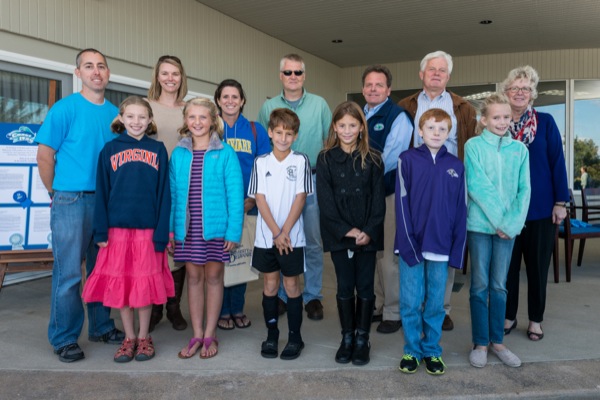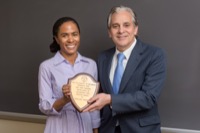
Fifth graders recognized
2014 Coast Day essay contest winners honored during ceremonies Oct. 5
2:34 p.m., Oct. 10, 2014--Before Superstorm Sandy made landfall in Delaware, Nicholas Holmon and his family bought a generator, filled the bathtubs with water and watched as their neighbors taped their windows to prevent the glass from shattering.
Holmon, now a fifth-grade student in Brandi Townsend’s class at Shields Elementary School in Lewes, detailed how he and his family prepared for the arrival of the 2012 hurricane in an essay for the 2014 Coast Day Fifth-Grade Essay Contest.
Honors Stories
National Medal of Science
Warren Award
“My dad looked at hotels out of the storm's path with plans to evacuate,” Holmon explained in his essay. “We took all the patio furniture and other loose things around the house and put them into the garage, so they couldn't cause damage to our house, our neighbors’ houses or hurt any people.”
The original account earned Holmon first prize in the annual essay competition.
Holmon and his fellow winners were recognized at a ceremony during Coast Day, held at the University of Delaware’s Hugh R. Sharp Campus in Lewes on Oct. 5.
Sponsored by the College of Earth, Ocean, and Environment (CEOE) and the Delaware Sea Grant College Program, Coast Day offers students, teachers and the community a unique opportunity to learn more about the ocean and coastal environment.
The fifth-grade students were asked to consider this year’s theme, “Weather and Climate: On Our Radar,” and describe how they monitor weather conditions and how they can best prepare for coastal hazards such as hurricanes, flooding and winter storms.
“Our essay contest not only requires the students to demonstrate some knowledge about coastal issues, but it also asks them to tap into personal experiences; while at the same time, giving them the opportunity to develop their writing skills,” said Chris Petrone, education specialist with Delaware Sea Grant.
The second place winner was Henley Mason, a student in Jill Szymanski’s class at Brandywine Springs School in Wilmington, and the third place winner was Rileigh Wilson, a student in Amanda Archambault’s class at Shields Elementary School in Lewes.
Honorable mention awards were given to: Callie Goff in Robin Hall’s class at Southern Delaware School of the Arts in Selbyville; Maggie Murphy, also in Szymanski’s class at Brandywine Springs School; and Conrad Rukowicz, also in Hall’s class at Southern Delaware School of the Arts.
“Each year, the essay contest allows us to look at pressing environmental topics through the eyes of our young people, and each year, I am always so impressed by the thoughtful responses of our students and the passion that they have for whatever topic we present,” said CEOE Dean Nancy Targett.
The students also were congratulated by Mark Moline, director of CEOE’s School of Marine Science and Policy; David Small, secretary of the Delaware Department of Natural Resources and Environmental Control; and Ted Becker, mayor of Lewes.
The essay by Holmon follows. All six winning essays can be read on the Coast Day essay contest web page.
For more information about Coast Day, which will take place next year on Sunday, Oct. 4, visit the website or call 302-831-8083.
Fifth-grade essay contest winner
Nicholas Holmon
Shields Elementary School
Teacher: Brandi Townsend
My parents are from California where there are earthquakes, but not many other natural disasters. There is no warning when an earthquake will hit, so mostly they just recovered from the damage after the earthquake was over. They were surprised when they moved to Delaware and discovered that in Delaware there can be coastal flooding from storm surges, severe winter storms, northeasters, tropical storms, and hurricanes. Their first winter here, everyone they talked to was worried about each snow storm that was expected and were surprised to find no bread or milk on the shelves at the store. Local news coverage would show the storm weather tracker and remind people how to be prepared. My dad bought a generator, gallons of water, canned foods, flashlights and a weather radio. Then he filled the bathtubs with water before each storm in case the electricity was out and the well pump was not working. He and my mom both started receiving weather alerts on their cell phones. They always got prepared.
But the plan changed when Hurricane Sandy was coming. It was not slowing to a tropical storm. The storm tracker was showing it landing right here in Lewes, Delaware. My dad looked at hotels out of the storm's path with plans to evacuate. We took all the patio furniture and other loose things around the house and put them into the garage, so they couldn't cause damage to our house, our neighbors’ houses or hurt any people. Some of our neighbors taped their windows and stayed in their basement. We might have done that too but we don't have a basement. Instead, we went to a hotel that had a backup generator, water and food available, but most importantly was not supposed to be affected by the storm. My mom and dad called our relatives to let them know we were fine, as we watched Hurricane Sandy on national news.
Since Hurricane Sandy I have learned a lot by reading the Delaware Homeowners Handbook to Prepare for Natural Hazards and NOAA/FEMA Winter Storm Preparedness Guide like checking on elderly neighbors to see if they need help, listening to the radio after a disaster to make sure the food and water are safe, and helping to rebuild. Now I think that I will be more prepared for the next big natural disaster.
Article by Cori Ilardi
Photo by Evan Krape








